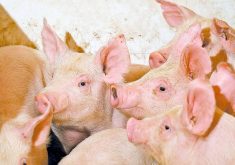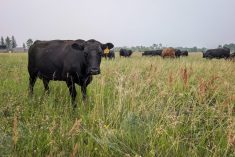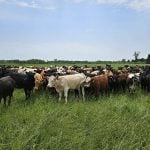A set-aside program has formally been launched to help Ontario’s 6,800-odd cattle producers maintain market-ready animals while Eastern Canada’s biggest beef slaughter plant remains closed.
Federal and provincial officials on Monday announced applications are now open for the Canada-Ontario COVID-19 AgriRecovery Beef Emergency Feed Maintenance Initiative, with applications for the first intake period due by 5 p.m. ET on Tuesday (Dec. 22).
The first intake set-aside period will begin Monday (Dec. 28), with future intakes to be assessed on a weekly basis, the governments said.
Cattle producers can apply if they own market-ready feedlot cattle or cull cows that they must keep on-farm due to “processing delays,” the governments said, not mentioning the temporary closure of Cargill’s slaughter and processing plant at Guelph due to a major COVID-19 outbreak among employees.
Read Also

U.S. grains: Soybean futures set two-week high on US weather worry, soyoil rally
Chicago Board of Trade soybean futures touched a two-week high on Friday on worries that heat may threaten U.S. crops and expectations that the country’s biofuel policy would boost demand for soyoil, analysts said.
Cattle accepted for enrolment in the plan must be kept on-farm for a set-aside period of 63 days to be eligible for a payment, or must receive approval to be released early.
Applicants under the program may not enroll more than 500 surplus animals per intake period. They also must provide the premises ID for the location where the cattle are to be fed.
For cattle that are approved for enrolment, each set-aside period will begin the following Monday.
To be eligible under the program, the average weight of each lot of cattle is 1,400 lbs. live weight for feedlot steers, and 1,300 lbs. live weight for feedlot heifers. Enrolled feedlot cattle are expected to make Grade “A” upon being processed, while culled cows are expected to make Grade “D” upon being processed.
In a separate release Friday, Beef Farmers of Ontario said it’s working in tandem with the Ontario Cattle Feeders Association, Canadian Cattlemen’s Association and the federal and Ontario governments on “other potential short-term measures to help mitigate the fallout from the current situation,” referring to the Cargill shutdown.
BFO on Friday also advised its members to consult with their nutritionists and veterinarians to “discuss animal health recommendations.”
Federal and provincial officials said Monday the set-aside program is budgeted for up to $5 million, as per an agreement reached this spring “to support these producers, in a timely manner, in the event that processing disruptions impacted the sector.” — Glacier FarmMedia Network
















